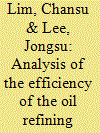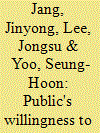|
|
|
Sort Order |
|
|
|
Items / Page
|
|
|
|
|
|
|
| Srl | Item |
| 1 |
ID:
176796


|
|
|
|
|
| Summary/Abstract |
This study investigated the efficiency of the oil refining industry using the two-stage method of Markowitz portfolio optimization theory and panel data analysis of about 30 OECD countries from 2005 to 2016, which is a new methodology for measuring the efficiency of the oil industry. The oil refining industry's efficiency is derived from the prices of petroleum products (Naphtha, Gasoline, Kerosene, Diesel, and Fuel Oil) using the portfolio theory. The panel data was constructed using the following dependent variables, the crude oil production efficiency, energy consumption, renewable energy consumption, and R&D investment. Using the panel data analysis, empirical analyzes are conducted on how the efficiency of the oil refining industry is affected by explanatory variables. The results show that crude oil production and energy use in OECD countries have a negative effect on the efficiency of the oil refining industry, and consumption of renewable energy and R&D investment have a positive effect. Contrary to conventional perception, the petroleum industry can coexist with the renewable energy industry for sustainable development.
|
|
|
|
|
|
|
|
|
|
|
|
|
|
|
|
| 2 |
ID:
111404


|
|
|
|
|
| Publication |
2012.
|
| Summary/Abstract |
Although the electric vehicle reduces pollutant emissions and results in reduced energy costs, lack of battery charging infrastructure and relatively high vehicle prices create challenges to the automobile industry and affect government support policies. To create a battery charging infrastructure, such as a vehicle-to-grid system, stakeholders need a quantitative analysis that decreases profitability uncertainty. The high cost of an electric vehicle can be offset by government subsidies that promote early marketing efforts, but an ex-ante evaluation of consumer demand is needed to analyze the effectiveness of any policy. This study provides information about optimal pricing based on consumer demand as well as the social welfare change effected by possible government subsidy polices for electric vehicles. Results show that the maximum profit for a vehicle-to-grid service provider will be 1.27 trillion Korean won/year with an annual subscription fee of 0.65 million Korean won. The government subsidy of 1 trillion Korean won, given annually, will increase social welfare by 1.94 trillion won and also boost the profit of vehicle-to-grid service provider to 1.98 trillion won.
|
|
|
|
|
|
|
|
|
|
|
|
|
|
|
|
| 3 |
ID:
104940


|
|
|
|
|
| Publication |
2011.
|
| Summary/Abstract |
Energy consumption has been drastically changed because of energy source depletion, price fluctuations, development and penetration of alternative energy sources, and government policies. Household energy sources are interrelated, and energy price and household characteristics, such as income level and dwelling size, affect the usage. To supply energy consistently and achieve a balance between production and consumption, stakeholders must understand consumer energy-consumption behavior. Therefore, this study identifies household heating energy usage patterns and the substitutive and/or complementary relationships between electricity and gas. Based on a multiple discrete-continuous extreme value model, household utility structure is identified from data on gas-heating usage. Results show greater utility and the smallest satiation values for gas boilers than for electric heaters and electric heating beds. The effects of consumer socioeconomic and environmental characteristics on the choice of heating energy sources were analyzed. Also, for further comparison, the respondents were split into high and low categories for income, heating degree days, dwelling size, and gas usage. Gas was found to be the most economical heating choice for households.
|
|
|
|
|
|
|
|
|
|
|
|
|
|
|
|
| 4 |
ID:
137741


|
|
|
|
|
| Summary/Abstract |
National energy planning has become increasingly complex owing to a pressing need to incorporate sustainability considerations. In this context, we applied least-cost and cost-risk optimization models to allocate energy sources for sustainable development in the Korean electric power generation industry. The least-cost model determined an electricity generation mix from 2012 to 2030 that incurs minimum generation cost to meet electricity demand. The cost-risk model determined electricity generation mixes in 2030 considering the risks associated with each energy source in order to lessen external risks. In deriving these optimal electricity generation mixes, we considered both conventional and renewable energy sources in conjunction with physical and policy constraints that realistically reflect Korean circumstances. Moreover, we accounted for CO2 and external costs within the electricity generation costs for each energy source. For sustainable development in Korea, we conclude that a portion of the coal and gas in the electricity generation mix must be substituted with nuclear and renewable energy. Furthermore, we found that least-cost allocation is sub-optimal from cost-risk perspective and that it limits the adoption of renewables. Finally, we also discuss the implications of decisions taken by the Korean government regarding the electricity generation mix for next-generation energy planning to achieve sustainability.
|
|
|
|
|
|
|
|
|
|
|
|
|
|
|
|
| 5 |
ID:
132637


|
|
|
|
|
| Publication |
2014.
|
| Summary/Abstract |
With the increasing importance of natural gas (NG) in the energy mix, the search for a reliable liquefied NG (LNG) supply has received great attention along with energy security in Korea. However, the current level of LNG supply reliability in Korea is much lower than that in other industrialized countries. In order to improve the reliability of the LNG supply, diverse policy measures are required, which come at an additional cost paid by society. This study aims to investigate the public×s willingness to pay (WTP) for improving the reliability of the LNG supply by increasing the LNG storage rate from the current level (11%) to 20%. To this end, the contingent valuation (CV) method is applied by using national survey data of 1000 households. In particular, this study employs a one-and-one-half-bound (OOHB) dichotomous choice model, combined with a spike model, to address the responses from the CV survey with zero WTP. The annual mean WTP is estimated to be KRW 9641 (USD 8.68) per household. Expanding the value to the national population provides a value of KRW 169.43 billion (USD 152.55 million). The results indicate that people are willing to shoulder the burden of safeguarding a reliable supply of LNG.
|
|
|
|
|
|
|
|
|
|
|
|
|
|
|
|
|
|
|
|
|